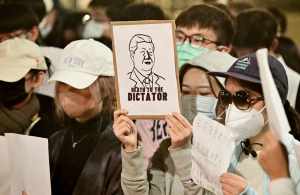Chinese authorities appear to be taking tentative steps to end its strict COVID curbs, a partial victory to thousands who took part in historic demonstrations against lockdowns last week and a rare concession from an authoritarian government in the face of popular pressure.
China’s leader Xi Jinping and top officials have over the last week signaled a change in its “zero COVID” approach to eradicating the virus, after enforcing ruthless lockdown and quarantine measures for almost three years.
Videos by VICE
Acknowledging young protesters’ “frustrations” against the COVID measures in a Thursday meeting with European Council President Charles Michel, President Xi said the dominant strain in China is now Omicron instead of the more lethal Delta. Some analysts interpreted the remarks, first reported by the South China Morning Post, as a sign that China would loosen restrictions because of the relative mildness of the variant.
A day before that, Vice-Premier Sun Chunlan, the top enforcer of the country’s COVID policy, said the “pandemic containment faces a new stage and mission” given the decreasing toxicity of the Omicron variant, higher vaccination rate, and the country’s experience in managing the pandemic. She also pledged to refine the policy, though details have not been announced yet.
Citing an unnamed infectious disease expert in China, state media outlet Yicai reported late on Sunday that China could downgrade COVID’s classification as a serious contagious disease as early as January.
Underscoring these comments, some local authorities have begun to roll back regular PCR testing and large-scale lockdowns that have become the norm in many parts of China. The Chinese capital Beijing shut testing booths in some neighborhoods, while Guangzhou redesignated many districts as “low-risk,” allowing residents to leave their homes for the first time in six weeks, even though the number of new infections in the city remains high.
Investors have embraced the small steps the world’s second largest economy is taking to open up, sending Chinese stocks soaring. But some experts have warned the country is ill-prepared for a transition and the potential surge in cases during the exit wave, due to its fragile healthcare system and low vaccination coverage.
Ben Cowling, a professor of epidemiology at the University of Hong Kong’s School of Public Health, said it’s unclear if China is indeed abandoning zero-COVID.
“At this moment, I have not seen any official announcement that zero-COVID is no longer the objective of the central government,” he said, noting that the National Health Commission’s mid-November guidelines to reform the country’s approach remained adamant about the goal of minimizing cases.
Cowling added that despite the tentative steps taken this week, “there’s an opportunity for the central government to revert.”
“Especially when some cities start seeing large numbers of cases and pressure on their hospitals. There may be at least a temporary reversion because it’s maybe too soon for the relaxation,” he said.
Already, there are signs of rising infections that will test the country’s readiness for opening up.
In Baoding, a city in Hebei province, social media users have described a large number of residents falling sick and getting fevers over the last few days. The veracity of these reports remains unconfirmed, however, and it’s unclear if COVID cases have risen as some districts suspended testing last weekend.
Some users have accused officials of misreporting the case count and not keeping people informed. “If there is accurate information from the government, people would be more vigilant and can take better measures to protect themselves,” a resident wrote in an article circulating on social media platform WeChat, lamenting the mixed messages people have received.
By sticking to the eradication strategy, China has remained a global outlier, as the rest of the world takes an endemic approach toward the coronavirus.
A Chengdu resident who took part in the protests last weekend fears the country could well revert to lockdown should another wave of outbreaks follow. The capital of Sichuan province has eased curbs since last week, scrapping COVID tests required for public transport and suspending construction of new quarantine facilities.
She took issue particularly with the Chinese government’s strict censorship, which she said has left many unprepared for reopening.
“The censoring of information is so severe that most people in China do not understand the virus and can’t make decisions based on scientific evidence,” she told VICE World News, requesting anonymity for fear of government reprisal.
China has, for instance, censored the remarks of WHO Director-General Tedros Adhanom Ghebreyesus, who in May called the country’s zero-COVID policy unsustainable.
“I think the government should first share data from the WHO with the public, so people are aware how they could live with the virus, before gradually relaxing unnecessary restrictions,” she added.
Another Chinese national, who joined a solidarity rally in Hong Kong and spoke with VICE World News on condition of anonymity, called the apparent easing of “zero COVID” a small victory for protesters, but hopes people won’t forget those who were arrested and paid a hefty cost for speaking out.
“I think this campaign has sowed the seeds of democracy among those who participated. They would realize collective action could have an impact,” she said.
More
From VICE
-

-

(Photos via J. Michael Jones; artemisphoto / Getty Images) -

Christoph Wagner/Getty Images -

(Photos via Softulka / Getty Images; Baltasar Engonga / Facebook)




